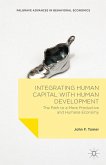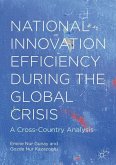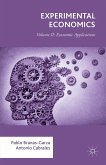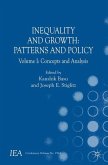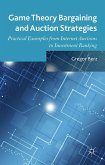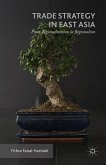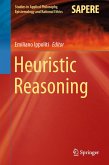Versandkostenfrei innerhalb Deutschlands
22,99 €
inkl. MwSt.
Versandkostenfrei*
Liefertermin unbestimmt
Melden Sie sich
hier
hier
für den Produktalarm an, um über die Verfügbarkeit des Produkts informiert zu werden.

11 °P sammeln
- Broschiertes Buch
We all want more information in order to make better decisions and calculate risk, but oftentimes that information is scarce. This new strategy, based on extensive cognitive and economic research, shows how to make financial decisions through a 'fast and frugal' method.
Andere Kunden interessierten sich auch für
![Integrating Human Capital with Human Development Integrating Human Capital with Human Development]() John F. TomerIntegrating Human Capital with Human Development76,99 €
John F. TomerIntegrating Human Capital with Human Development76,99 €![National Innovation Efficiency During the Global Crisis National Innovation Efficiency During the Global Crisis]() Emine Nur GunayNational Innovation Efficiency During the Global Crisis76,99 €
Emine Nur GunayNational Innovation Efficiency During the Global Crisis76,99 €![Experimental Economics Experimental Economics]() Antonio CabralesExperimental Economics91,99 €
Antonio CabralesExperimental Economics91,99 €![Inequality and Growth: Patterns and Policy Inequality and Growth: Patterns and Policy]() Inequality and Growth: Patterns and Policy76,99 €
Inequality and Growth: Patterns and Policy76,99 €![Game Theory Bargaining and Auction Strategies Game Theory Bargaining and Auction Strategies]() Gregor BerzGame Theory Bargaining and Auction Strategies91,99 €
Gregor BerzGame Theory Bargaining and Auction Strategies91,99 €![Trade Strategy in East Asia Trade Strategy in East Asia]() Fithra Faisal HastiadiTrade Strategy in East Asia76,99 €
Fithra Faisal HastiadiTrade Strategy in East Asia76,99 €![Heuristic Reasoning Heuristic Reasoning]() Heuristic Reasoning76,99 €
Heuristic Reasoning76,99 €-
-
-
We all want more information in order to make better decisions and calculate risk, but oftentimes that information is scarce. This new strategy, based on extensive cognitive and economic research, shows how to make financial decisions through a 'fast and frugal' method.
Produktdetails
- Produktdetails
- Palgrave Advances in Behavioral Economics
- Verlag: Macmillan Education / Palgrave Macmillan US / Springer Palgrave Macmillan
- Artikelnr. des Verlages: 978-1-137-57078-9
- 1st ed. 2019
- Seitenzahl: 240
- Erscheinungstermin: 29. September 2020
- Englisch
- ISBN-13: 9781137570789
- ISBN-10: 1137570784
- Artikelnr.: 44519312
- Herstellerkennzeichnung
- Palgrave Macmillan
- Tiergartenstr. 17
- 69121 Heidelberg
- ProductSafety@springernature.com
- Palgrave Advances in Behavioral Economics
- Verlag: Macmillan Education / Palgrave Macmillan US / Springer Palgrave Macmillan
- Artikelnr. des Verlages: 978-1-137-57078-9
- 1st ed. 2019
- Seitenzahl: 240
- Erscheinungstermin: 29. September 2020
- Englisch
- ISBN-13: 9781137570789
- ISBN-10: 1137570784
- Artikelnr.: 44519312
- Herstellerkennzeichnung
- Palgrave Macmillan
- Tiergartenstr. 17
- 69121 Heidelberg
- ProductSafety@springernature.com
Shabnam Mousavi is assistant professor at the Johns Hopkins University Carey Business School and a fellow of the Max Planck Institute for Human Development, Center for Adaptive Behavior and Cognition. Her research on practical decision-making in business has been featured in Science News, Johns Hopkins Magazine, and Die Zeit. She has received a Wisdom Project grant from the University of Chicago, and serves as secretary to the Society for Advancement of Behavioral Economics, as well as member of the editorial board for the Journal of Behavioral and Experimental Economics.
Rethinking Behavioral Economics through the Science of Heuristics Preliminary Table of Contents Preface by Gerd Gigerenzer Chapter 1: Heuristic Decision Making An overview of scientific conceptions and definitions Research questions related to different conceptions Two research programs Behavioral economics implications: Behavioral insight and beyond Chapter 2: Rationality of beliefs, actions, and norms Visions of rationality in decision science The relative place of heuristics, logic, and statistics Bounded rationality Behavioral economics implications: Design of Institutions Chapter 3: Ecological rationality As a cognitive program of study As a type of rationality in economic decision making As a normative benchmark Behavioral economics implications: Simple solutions for complex problems Chapter 4: Risk and uncertainty Frank Knight's typology of risk and uncertainty in the market Jimmy Savage's formulation of von Neumann-Morgenstern expected utility Artificial intelligence treatment of the bias-variance dilemma Homo economicus vs. Homo heuristicus Behavioral economics implications: How to minimize the magnitude of financial crises Chapter 5: Process of information Deductive, inductive, and heuristic Creation of knowledge Distinction between the actor and the modeler Preference vs. inference Behavioral economics implications: Improving the health care system Chapter 6: Fast-and-frugal heuristics Mind as an adaptive toolbox Categories and their members Building blocks Rules and manifestations Behavioral economics implications: Risk savvy citizens in a democracy
Rethinking Behavioral Economics through the Science of Heuristics Preliminary Table of Contents Preface by Gerd Gigerenzer Chapter 1: Heuristic Decision Making An overview of scientific conceptions and definitions Research questions related to different conceptions Two research programs Behavioral economics implications: Behavioral insight and beyond Chapter 2: Rationality of beliefs, actions, and norms Visions of rationality in decision science The relative place of heuristics, logic, and statistics Bounded rationality Behavioral economics implications: Design of Institutions Chapter 3: Ecological rationality As a cognitive program of study As a type of rationality in economic decision making As a normative benchmark Behavioral economics implications: Simple solutions for complex problems Chapter 4: Risk and uncertainty Frank Knight's typology of risk and uncertainty in the market Jimmy Savage's formulation of von Neumann-Morgenstern expected utility Artificial intelligence treatment of the bias-variance dilemma Homo economicus vs. Homo heuristicus Behavioral economics implications: How to minimize the magnitude of financial crises Chapter 5: Process of information Deductive, inductive, and heuristic Creation of knowledge Distinction between the actor and the modeler Preference vs. inference Behavioral economics implications: Improving the health care system Chapter 6: Fast-and-frugal heuristics Mind as an adaptive toolbox Categories and their members Building blocks Rules and manifestations Behavioral economics implications: Risk savvy citizens in a democracy

